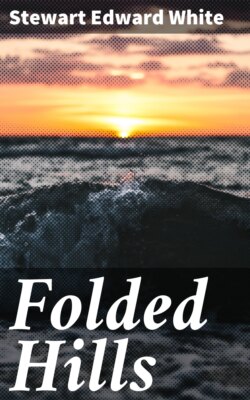Читать книгу Folded Hills - Stewart Edward White - Страница 19
На сайте Литреса книга снята с продажи.
4
ОглавлениеTable of Contents
By the afternoon of the third day they had completed the circle, had advanced north through the low wide Sierra foothills, and had reached the transverse cañon which Andy had made out from afar. Panchito and the other vaqueros learned a great deal about travel in a hostile country. Andy recalled the time of his own initiation as a youth, and how patiently Joe Crane had elucidated things that must have seemed to him obvious. He stopped every once in a while to explain, then, to the Californians, the reasons for what he did. They crowded their horses about him, bending forward to catch his lowered voice, their teeth flashing in their dark faces with pleasure of comprehension. The things he told them were, to him, so elementary that they should need no telling. But again he remembered Joe Crane.
They rode the slopes just below the ridges of the hills where the footing was difficult, what with chaparral and rock formations, and the route was tortuous and long rather than in the valleys where the going was good and the distances were shorter. Thus one gained cover; one could see abroad; one followed the unexpected way. Below every new summit, short of each new shoulder of hill or twist of valley, Andy left his horse with his men and went forward afoot. If there were no cover behind which he could crawl to skyline or angle of bend, he thrust forward a bit of cut brush, moving it into place by inappreciable degrees. After which he lay on his belly and scrutinized the new prospect into which next they must venture. His patience was exhaustless. Long after a man of ordinary pertinacity might have seemed justified in concluding the valley, or the pocket, or the hill vacant of human life, Andy continued to lie flat against the sun-baked earth, his keen eyes sweeping back and forth, back and forth tirelessly, never for a moment losing their focused concentration, though there appeared to be nothing to see. That there were no chance wayfarers he had determined in the first ten seconds; and as to lookouts or scouts, he knew better than to look for them, for they would be hidden. But he knew also that a man watching, unless in immediate expectation, will, within his concealment, move about more or less, stretch and yawn in monotony, shift his position for comfort or a better view; and that these movements must be remarked in vigilance or in curiosity by the animals and birds. So until he had taken account of every living thing, and had satisfied himself that its conduct was undisturbed, he continued his scrutiny. Any deviation from the normal must explain to him its cause. This made a long job, for wild creatures are wary, and a passing cat or coyote, a lolling bear, even the swift gliding shadow of a hawk creates its flutter of resentment or of fear. Sometimes Andy was quickly reassured, at least as to certain localities. Whenever, for instance, he could make out the blue of a jay whose mind was tranquil; for he knew well that jays are prone to violent indignations over the slightest intrusions and feel called upon to tell the world, and to continue to tell the world. In the body politic of the wilds the jay was always, on the slightest excuse, viewing with alarm.
At times it seemed to his companions that their master would never finish his inspection. That was when the larger and more trustworthy indications, like jays or jack rabbits or deer, were entirely lacking, and he had to depend on the reports of littler and more indifferent people. But when at last he arose to his feet and motioned them up, he did so with complete confidence.
Early in the afternoon of the third day, then, Andy slipped back after his first searching glance over the hill crest. He returned to the waiting men, his eyes shining with satisfaction.
“The luck is with us,” he told them in a low voice. “They are there, in the bottomland. Come with me, Panchito; you others remain here. And keep quiet.”
